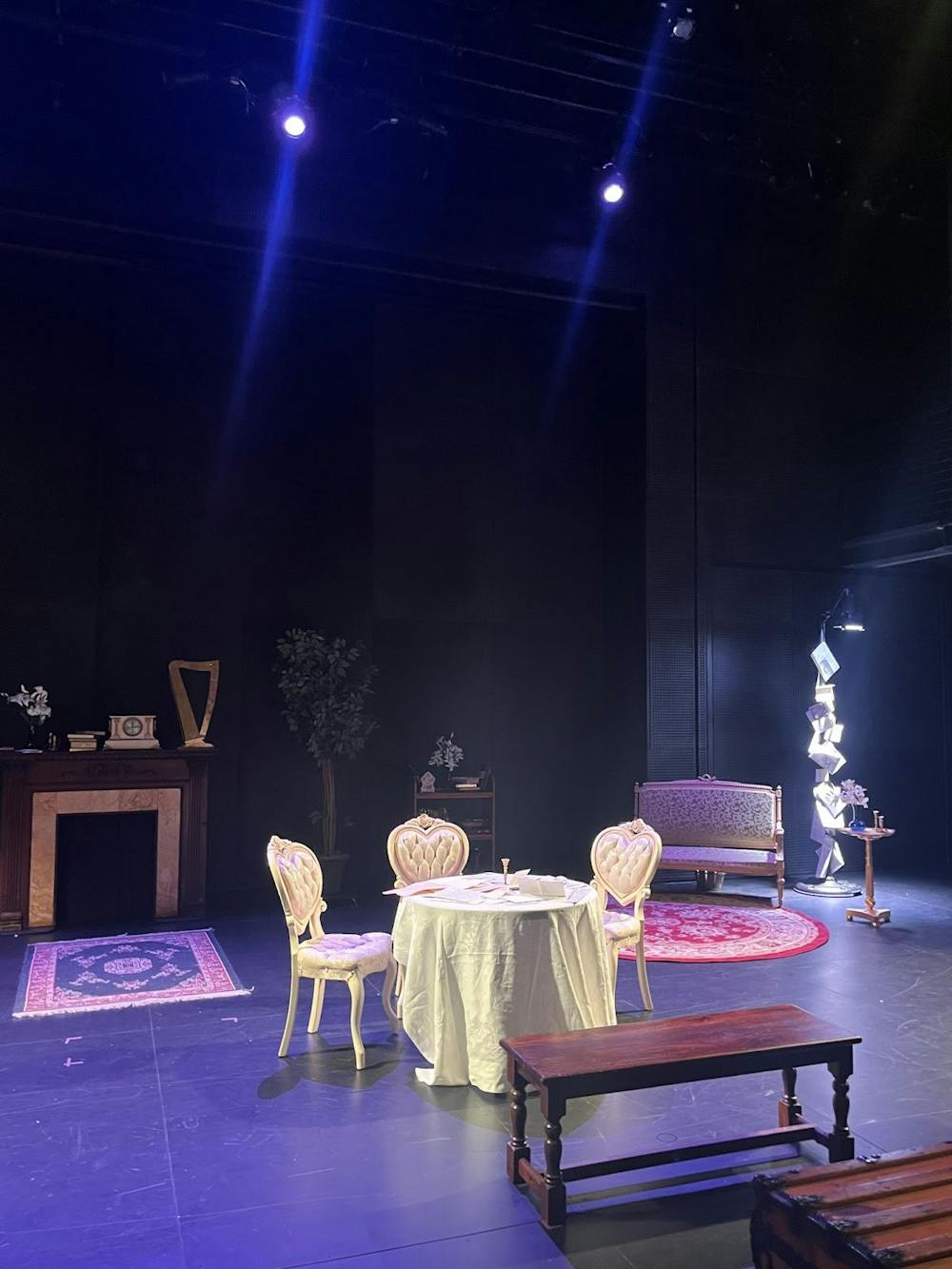How do we find a balance between our relationships with art, others, and ourselves? “Affecting Expression” explores this question by showcasing the history of the queer experience for modern audiences.
The cast includes Magdalena Poost ’23 as Charlotte Cushman, Juliette Carbonnier ’24 as Hatty Hosmer, Sam Melton ’23 as Dramatis Personae, and Rosemary Paulson ’23 as Matilda Hays for her acting thesis. The play, written by Eliana Cohen-Orth ’21 and directed by Eliyana Abraham ’23 for her directing thesis, was presented in Wallace Theater from Oct. 7 through Oct. 9. Inspired by a biography of Charlotte Cushman, “When Romeo was a Woman” by Lisa Merrill, the play frames ambition, love, and loss through the lens of the queer experience.
As soon as the lights dimmed, all was silent for a moment, until Melton jumped out of a large chest placed in front of the first row, sending ripples of enthusiastic anticipation throughout the crowd. So began the journey into the history and world of Cushman, Hays, and Hosmer, three queer women whose lives and artistic paths intersected during their time living together in Rome.
Throughout the play, the combination of historical facts and creative elements developed a theme of finding yourself within art without letting it consume you. Where does the distinction lie? Where do lines start to blur? The depiction of three art forms — Cushman’s acting, Hays’s writing, and Hosmer’s sculpting — gives insight into the characters’ self-discovery as they seek out meaning in their work.
Cushman’s acting career highlights the consequences of not maintaining a balance between one’s craft and one’s life. Via the inclusion of Dramatis Personae — the embodiment of Cushman’s relationship with theater — the audience was able to peer into her mind to understand her struggles with whether to leave her acting career behind for a life of simplicity.
Hays and Hosmer, meanwhile, are confronted with troubles of their own. Hays is faced with the challenge of loving someone else, while also trying to love herself by investing time into her aspirations. Hosmer, who is presented as confident from the beginning, struggles with what to do when others are quick to accredit her work to men.
At the start, we are presented with Cushman as a successful actress, Hays as her companion, and Hosmer as her pupil. Yet, as these characters come into their own, we see a new layer to their identities. When Cushman is absent from one scene, Hosmer questions Hays about Hays’ novel to learn more about how it reflects her identity. Hays claims that the version of her who wrote the story was “filled with passion” and no longer represents her true self. However, during the fallout between Cushman and Hays at the end of the play, which results in an emotional outburst from Hays that seems almost uncharacteristic, the audience is left wondering if this is true. Scenes like this contribute to the underlying question the play asks — whether we really leave our pasts behind or, rather, if our pasts shape our identity even in the present.
Everything about the show, from the costumes to the set to Melton’s piano playing, keys the audience into the characters’ emotions. More than just the intertwining of the three characters’ lives on stage, through the fog that filled the air above our seats and the newspapers that fell from the ceiling, we were also woven into the story.

After the show concluded, Dean of the College Jill Dolan and Professor of Theater Stacy Wolf hosted a talkback with Poost, Carbonnier, Melton, Paulson, Cohen-Orth, Abraham, and Merrill, the author of Cushman’s biography. As discussed in the conversation, an encompassing theme of the show was community — not only the community created between the three women, but also the representation of the queer community as a whole. In relation to this conversation, Merill noted that despite the acclaim that Cushman received during her career, homophobia led to her erasure from history.
Beyond the thematic elements of the play, the cast and crew also discussed the importance of having a rehearsal space where they could bring “their whole self.” Having gentleness for oneself and others was an integral value to the production: the cast explained that it made the rehearsal process more gratifying and helped bring themselves into their characters. As the talkback concluded, Poost reflected on the lessons she learned during the process by saying, “beyond even in theater, but yes, [also] in theater, there is always more room to be gentle with people.”
The initial excitement I experienced from that very first scene when I was drawn in by Dramatis Personae continued throughout the play. Through the meta-theatrical elements and the emotional range of the characters, I became invested in the stories of three women who, two hours previously, I had known nothing about. Through Cohen-Orth’s writing, Abraham’s directing, and all four actors’ performances, stories that were previously written out of history were brought to life.
Regina Roberts is a contributing writer for The Prospect and the Podcast section at the ‘Prince.’ She can be reached at rr8156@princeton.edu, or on Instagram @regina_r17.









